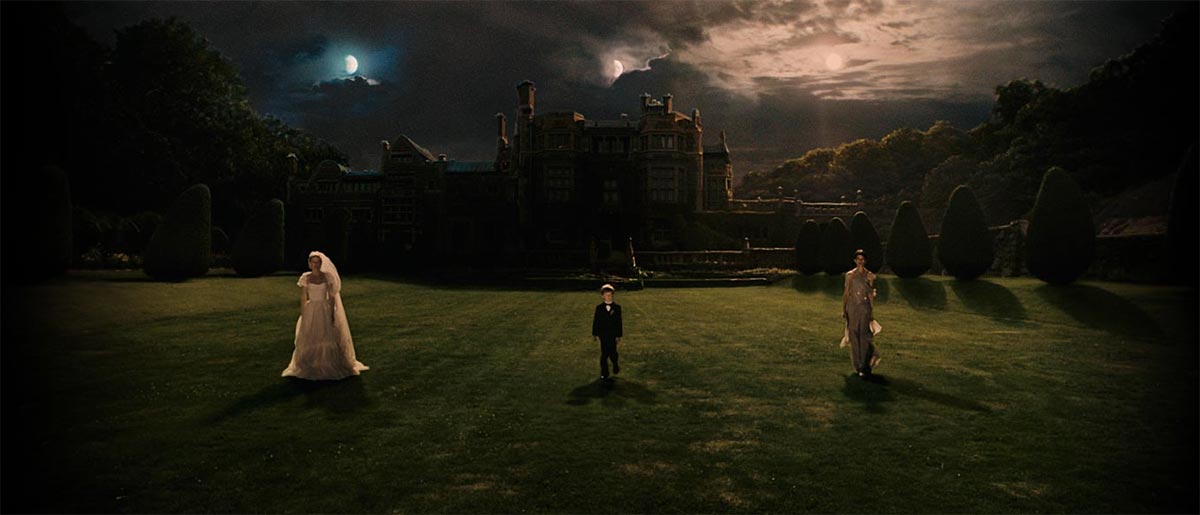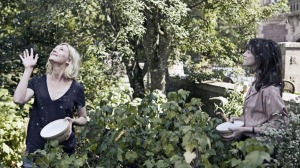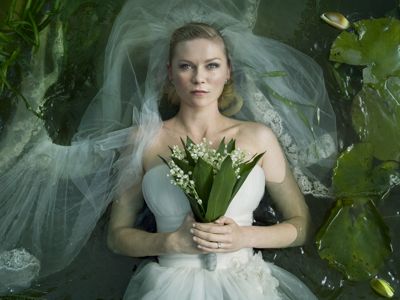
Melancholia is the moniker, melancholia is the mood. Its most certainly a case of name reflects nature for the latest offering from Lars Von Trier. Anyone familiar with Von Triers body of work will be aware of his excruciating fascination or preoccupation with depression and mental illness. The landscapes he generates are rife with stark and often brutal imagery and depict a world of hopelessness and fatalistic nihilism. This of course mirrors Von Triers own trysts with depression, directing being his creative outlet. It’s interesting that he uses his vast imagination to conjure characters and situations bogged down with the weight of their own mental irregularities. Just like the old innocuous sign that reads ‘you don’t have to be mad to work here, but it helps’, you don’t need to have experienced mental health struggles yourself to appreciate Von Triers films, but it certainly turns them from pretentious to profound if you have. The slow, near-stasis of his films is not for all, but if you enjoy the journey as much as the destination, then it is quite appealing to lose yourself in his nightmarish worlds. This film as a dystopian drama follows the apocalyptic fate of the family, and the planet as a whole.

Melancholia also announces the return of Hollywood fluffy bunny Kirsten Dunst, who has dabbled with the dark side with former films Interview with the Vampire and the Virgin Suicides but is more acquainted with lighter, sprightly roles, portraying the all American girl. What’s so appealing about Dunst in this role is that she recently experienced her own fall from grace when she suffered a bout of depression of her own and as such, the role of Justine, the manically depressed bride, takes on a reverence and a realism that Dunst conveys perfectly. If anyone doubted the star of such films as Bring It On or Jumanji was not up to scratch in such a contemplative movie, they are wrong entirely. Dunst is both beautiful and bleak as she brilliantly portrays the annihilating incompressibility and alienation of the fog of depression. Charlotte Gainsbourg makes a welcome return as Justine’s sister Claire. With her melodious, ethereal presence, Claire is the opposite of her sister, having achieved and been able to hold down a conventional life which she seems to find fulfilment in.

The film begins with what could be considered a prologue or prelude to the events which follow. We are shown a series of frames and sequences without dialogue which set up the characters and give us a taste of what may be to come. Justine in her wedding dress wanders across the green bound by creeping vines; Claire carries her son Leo whilst trudging across the lawn as though it were mud, leaving behind painstaking foot prints. This sets Justine up as the innocent, passive victim, the individual dealing with the ramifications of severe depression, who is trying to move forward with life but is constantly bound and pulled back by the bindings of her illness. Claire meanwhile, is perceived as the care giver, not only to Leo, but to Justine, but she is literally weighted down with the responsibility of having to look after Justine and an illness that she cannot fully grasp nor understand. By centering on the family, Melancholia explores the domesticity of depression and the ways in which it eats away at our ability to enjoy experiences and destroys relationships, establishing itself as a character in family life. In the end, Claire and Justine are equally consumed by the evils of mental illness. As Justine, Claire and Leo slowly wander across the green, Justine is shadowed by Melancholia, Claire by the sun and Leo by the moon. The haunting and provoking music of Wagner, which builds to an intense and unsettling strain, introduces us finally, to Melancholia.

The story unfolds in two parts with two sisters, two stories and two reactions. The first follows Justine and her slow transcendence from a successful, accomplished newly promoted art director and wife (indeed Justine is on the cusp of endless potential), into the depths of despair and finally into a flat, remote acceptance. Justine transforms from sunshine itself into a husk of a person. There are many hints as to the origin of Justine’s condition. She has a bullying and cynical mother who does not believe in marriage – executed with convincing cruelty by Charlotte Rampling. Her father, though devoted appears brow beaten and forgetful. Her husband (Alexander Skarsgard), picture perfect, does not really understand the gravitas of her illness and thinks that by making an honest woman of her and locating for her the perfect home, he van vanquish her misery. Everyone is intent on reminding Justine that she should smile, he happy and not make a scene. In the splendid and succulent scenery of her opulent surroundings, neat and ordered and yet oddly devoid of warmth and feeling, Justine’s perfectly constructed facade begins to crumble. The guests recreate a sense of staged happiness, money has been thrown at her, she has been done up to the nines, she has everything she could want for in terms of security and acceptance, and yet Justine, on what should be the best day of her life, begins to plummet and self sabotage in such a way that by the end of the night, she is left with nothing and seems peculiarly reminiscent of a young Miss Havisham in the making; embittered, hateful and exaggeratedly cruel. In her inability to feel happiness, Justine pushes herself into confrontations and adulterous situations, betraying those closest to her for some crumb of feeling. Through her we experience the deep expanse of her despair, with all its overwhelms and underwhelms – bored by her marriage and yet incapable of bathing, she acts with the feckless abandon of someone who knows the end is nigh. Whilst Justine sets about destroying her own future, she also begins to notice a change in the stars. A planet named Melancholia, previously hidden behind the sun, and expected to bypass the
earth, has emerged.

In Part two, Justine has regressed to an incapable, terrified child and the nature of her harrowing dependency on Claire is clear. Claire does her best to juggle the needs of her resolutely scientific husband John (Kiefer Sutherland) and son, whilst patiently tolerating Justine’s extremes of behaviour. Justine speaks of the earth being evil and of knowing that there is nothing outside of their existance.
There are endless scenes of movement for movement’s sake; the sisters ride horses, but Justine can never pass the bridge (she can never escape her depression), she drives the golf cart, trudges through mud, all with the hope that her movement will generate some sense of purpose. As Melancholia comes closer, the sisters’ roles begin to reverse. Justine calmly accepts and wills the end of Earth to be, whilst Claire falls into a chasm of fear, dread and panic. Justine comes to represent the perfect embodiment of depression, whilst Claire becomes anxiety. In between rests Leo, passive and outside of either’s direct influence, instead a naive, even optimistic observer. Excited as he is to witness the passing of the planet, he cannot will himself to stay awake. This is because whether the world ends or not, this does not really concern him. He is not consumed by inertia, or terror, he is protected by a child’s sense of wonderment and hope. If we take Claire to be represented by the sun, she has literally been blind sighted by the arrival of Melancholia, and in not expecting it, cannot accept that Earth is coming to an end.
Meanwhile Claire, who long ago made peace with her own depression, can accept the eradication of both herself and the wider world. Once it becomes apparent that Melancholia will collide with the earth, Claire wishes to partake in a human ritual; she wants to sit and drink wine on the terrace whilst Justine sings. Justine knows such rituals are meaningless, just as her marriage was. They are hollow shams to create the illusion of happiness, but the gravitas of life does not change. Instead, Justine creates a ‘secret cave’, which evokes childlike magical thinking but also alludes to the faith we place in religion, where the three sit and wait out the impending disaster. Claire hyperventilates in animalistic fear, Justine serenely accepts what is to come, and Leo faithfully closes his eyes and places his trust in their secret cave.

The films angle is interesting. The profound impact of the end of the world is revealed through the vacuum of the fragmented family. We know nothing of the wider world’s perceptions; we only witness Justine and Claire’s experiences. The looming ball that is Melancholia is symbolic of the feelings of depression sufferers – they literally feel the planet is falling down on them and there is nothing left to live for. The collision may destroy the world, but Justine’s life is already ended – she is unable to enjoy it. To further complicate a straight reading of Melancholia as a story about a depressed girl facing the end of the world, Justine seems to be able to tell the future. It is inferred that although Justine has always been predisposed to depression, what may have triggered her extreme episode is the awareness that the world was due to end. She grows preoccupied with the stars, tries to tell her mother she fears something outside of her direct life and seems to promise Leo they will build secret caves long before there is a need to. She can predict the number of holes on the golf course, and the number of beans in a jar. She too can tell that life will end, and that the end is coming. Driven crazy by this knowledge at first, she grows familiar with it with the cool, cold glaze of depression. It also seems poetically ironic that Claire wishes to die out on the terrace drinking wine. The film seems like an ode to the death of capitalism and the self-destruction of the affluent world, represented by Claire’s husband and their luxurious home. The symbolism, colour and visuals of the film are gorgeous and remind me of some of the haunting images concocted by Kubrick.

Bizarrely life affirming, Melancholia is a perfect depiction of the malady of depression, at times feeling poignant, as if solid blocks of despair have been hacked off and held up for all to see. Maddening, infuriating, illuminating, claustrophobic, many sufferers will see themselves in this film, and many well wishers will recognise themselves in the role of care taker Claire. Its not all doom and gloom, there is a dark and subtle kind of humour to be found in this tale, particularly from Udo Kier as the wedding planner, but essentially we are dealing with a beautiful end of the world film, from the eyes of two sisters experiencing two very different realities.
Beautiful review for a beautiful movie.
ReplyDeleteI checked Melancholia out last week and your review blew me away. You have made some great observations here. Keep writing. x-b-x
ReplyDeleteThank you both :)
ReplyDeleteIt is a very beautiful movie. Definitely not to everyones taste! I'm glad that you both liked the film and my review!
xoxox
Blog coś mi się powoli ładował. Jakieś problemy z serwerem ? Zapewne jest to tymczasowe i na darmo panikuję.
ReplyDelete